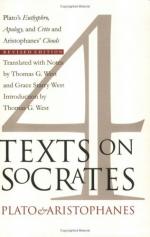
|
| Name: _________________________ | Period: ___________________ |
This test consists of 15 multiple choice questions and 5 short answer questions.
Multiple Choice Questions
1. Why is Socrates heartened about the possibility of an afterlife?
(a) He will be able to visit oracles and learn about other lands.
(b) He will finally be the warrior he was destined to be.
(c) He will be able to properly plot his revenge upon the living.
(d) He will be able to continue his philosophical discussions there.
2. What sentence does Meletus suggest for Socrates?
(a) An imprisonment of ten years.
(b) A fine.
(c) An imprisonment of one year.
(d) Death.
3. Why does Euthyphro decide to end his conversation with Socrates?
(a) Euthyphro successfully argued his case, and emerged victorious.
(b) Euthyphro was personally insulted after Socrates mentioned his father.
(c) Socrates has become belligerent and angry.
(d) He is frustrated at the logical traps Socrates has put him in.
4. What is Socrates' general attitude toward the citizens of Athens?
(a) Challenging.
(b) Jealous.
(c) Murderous.
(d) Friendly.
5. What does Socrates tell his friends and supporters after his sentence is decided?
(a) He asks them to never look upon him again.
(b) He asks them to visit him and talk with him.
(c) He berates them for their lack of support.
(d) He makes them promise to build a bigger school after his death.
6. What does Socrates discover when he speaks with and interviews "wise men"?
(a) He realized they were simply trying to get him to convert to worshiping Apollo.
(b) He discovers they know nothing.
(c) Wise men is where Socrates got all his knowledge from.
(d) They are nearly as intelligent as himself.
7. Which god does Euthyphro admire above all others?
(a) Hephaestus.
(b) Apollo.
(c) Zeus.
(d) Hera.
8. Socrates not only challenged Athenian morality but ... ?
(a) Athenian restrictions on diet.
(b) Athenian political power.
(c) Athenian understanding of fish and water fowl.
(d) Athenian sense of purpose.
9. In regards to corrupting youth, what solution does Socrates see for correcting his tendencies?
(a) Twenty lashes.
(b) Mere instruction for how to teach better.
(c) A small fine.
(d) A sabbatical to Delphi.
10. What does Socrates believe is the central question of life?
(a) How should one live one's life?
(b) What is the meaning of piety?
(c) How does one acquire knowledge?
(d) What is it all for?
11. Who does Euthyphro compare to himself and his father?
(a) Zeus and Hercules.
(b) Zeus and Hera.
(c) Plato and Socrates.
(d) Zeus and Kronos.
12. Which is the second of three Socratic dialogues written by Plato?
(a) Apology.
(b) The Clouds.
(c) Crito.
(d) Euthyphro.
13. What is the name of Zeus' father?
(a) Kronos.
(b) Titan.
(c) Hades.
(d) Hercules.
14. Why does the Athenian community treat Euthyphro with contempt and derision?
(a) He frequently dresses up as a woman.
(b) He stole chickens from his own brother.
(c) He is claiming an olive tree orchard that is not his.
(d) He is putting his own father on trial.
15. According to Socrates, when pursuing the truth, a person should defer to what authority?
(a) A social reformer.
(b) A religious leader.
(c) A person should not defer to any authority.
(d) A political leader.
Short Answer Questions
1. According to Euthyphro, when the Athenian people are pious, what happens?
2. Why is "true speech" often not persuasive?
3. What does Socrates tell the jury after his sentence is decided?
4. According to Socrates, what is dangerous about the conclusion that human good is related to what is dear to the gods?
5. What topic does Socrates discuss to dismantle Euthyphro's initial definition of piety?
|
This section contains 678 words (approx. 3 pages at 300 words per page) |

|




